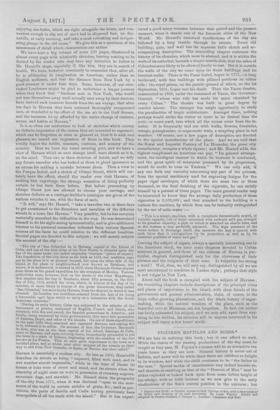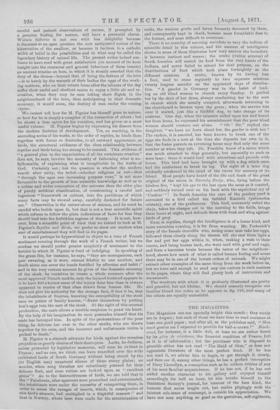FIGUIER'S REPTILES AND BIRDS.* WE are late in noticing this
book ; but it can afford to wait. While the charm of the passing productions of the day must be caught as they pass, M. Figuier's volumes will be as attraotive ten years hence as they are now. Natural history is never out of fashion, and never will be while there there are children to delight in its wonders, and while the child continues to be "the father to the man." Special modes of classification may indeed become so, and theories as startling as that of the " Descent of Man" may be either exploded or looked back upon from some loftier height of knowledge, with as little interest as we now give to the early vindications of the Sun's central position in the universe ; but
* Reptiles and Birds : a Popular Account af their Various Order:4, with a Description of the flat Os and Economy of the 1710Si Interesting. By Louis Figuler. Edited and adapted by Parker Gilmore (" Ubique"). Loudon: Ohapmau and
careful and patient observations of nature, if prompted by a genuine feeling for nature, will have a perennial charm. White's Selborne is not one whit less delightful because it discusses as an open question the now antiquated notion of the hibernation of the swallow, or because it inclines to a catholic width of belief in the possibilities and in what may be called the legendary history of animal life. The present writer indeed con- fesses to have read with great satisfaction (on account of its keen insight into the character and general behaviour of those insects) an ancient treatise on bees, in which it is stoutly asserted that the duty of the drones—beyond that of being the fathers of the hive —is to hatch by the warmth of their bodies the eggs of the work- ing mothers, who on their return home after the labours of the day suffer their useful and obedient mates to enjoy a little air and re- creation, when they may be seen taking short flights in the neighbourhood of the hive, thus anticipating in their domestic economy, it would seem, the destiny of men under the coming regime.
We cannot tell how far M. Figuier has himself gone to nature, or how far he is simply a compiler of the researches of others ; but he shows a true spirit for his vocation, and has given us a most useful volume. M. Figuier begins by expressing his dissent from the modern doctrine of development. Yet, on reaching, in the ascending series of his works, to the order of reptiles, he binds them together with forms so dissimilar, to all outward appearance, as birds, the structural evidences of the close relationship between reptiles and birds being too strong to be resisted. This evidence of "a general plan in the organization of all the vertebrate creation" does not, he says, involve the necessity of fathoming what is un- fathomable, of explaining what is inexplicable in the works of God. Certainly not ; but the question is whether the modern search after unity, the belief—whether religious or not—that "through the ages one increasing purpose runs," is not more favourable to the growth of true scientific knowledge as well as to a nobler and wider conception of the universe than the older plan of purely artificial classification, of constructing a careful and ingenious "framework or cabinet, into the partitions of which many facts may be stowed away, carefully docketed for future use." Observation is the corner-stone of science, and he must be careful who builds upon it, but that is not a true scientific spirit which refuses to follow the plain indications of facts for fear they should lead into the forbidden regions of theory. It is not, how- ever, from a scientific point of view that we intend to look at M. Figuier's Reptiles and Birds, we prefer to show our readers what sort of entertainment they will find in its pages.
It would perhaps be hypercritical to object to a tone of French sentiment running through the work of a French writer, but we confess we should prefer greater simplicity of treatment to the heroics in which M. Figuier is fond of indulging. In speaking of the green ibis, for instance, he says, "they are monogamous, each pair swearing, as it were, eternal fidelity to one another, and death alone can sever the bonds fortified by affection and habit ;" and in the very curious account he gives of the domestic economy of the stork, he contrives to create a whole romance after the most approved French models, only the injured husband appears in it to have felt a keener sense of the injury done him than is always apparent in stories of that class drawn from human life. He does not give his authority for the strange fact, if fact it be, that the inhabitants of Smyrna, knowing the susceptibility of the stork race on points of family honour, "divert themselves by putting hen's eggs into the nest of the stork. At the sight of this unusual production, the male allows a terrible suspicion to gnaw his heart. By the help of his imagination he soon persuades himself that his mate has betrayed him. In spite of the protestations of the poor thing, he delivers her over to the other storks, who are drawn together by his cries, and the innocent and unfortunate victim is pecked to death."
M. Figuier is a staunch advocate for birds against the senseless prejudices or greedy desires of their destroyers. Larks, he declares, unless protected by legislative measures, will soon be extinct in France ; and no one, we think, can have travelled over the wide cultivated lands of South Germany without being struck by the (to English ears) unnatural silence of those sunny plains; no wonder, when song thrushes are relentlessly pursued for their delicate flesh, and even robins are looked upon as "excellent game"? As to the destructiveness of birds, we are told that in the "Palatinate, after sparrows were proscribed and exterminated, the inhabitants were under the necessity of reimporting them, in order to arrest the ravages of insects, which, in consequence of this bird's absence, had multiplied in a frightful manner;" and that in Norway, where laws were made for the extermination of rooks, the noxious grubs and larva:, formerly devoured by them, and consequently kept in check, became most formidable foes to the former, and most difficult to overcome.
There is no scarcity of amusing anecdote to vary the tedium of scientific detail in this volume, and the amount of intelligence shown in some of them illustrates how very narrow the boundary is between instinct and reason ; the urulou (vultur atratus) of South America will snatch its food from the very hands of the Indians, and never failed to attend for that purpose, on the distributions of food which took place fortnightly at the different missions. A urubu, known by its having lost a foot, used to come regularly to two separate missions twenty leagues asunder on the appointed days of distribu- tion. "A gander in Germany was in tine habit of lead- ing an old blind woman to church every Sunday. It guided her by the skirt of her dress, always conducting her to the seat in church which she usually occupied, afterwards returning to the churchyard to browse upon the grass ; when the service was over it waited, just like a faithful dog, to take charge of its mistress. One day, when the minister called upon her and found her from home, he expressed his astonishment that, the poor blind
woman should venture out alone. " Oh ! Sir," replied the daughter, "we have no fears about her, the gander is with her." The cuckoo, it is asserted, has been known to break one of the eggs she finds in a nest at the time she deposits her own in it, that the foster parents on returning home may find only the same number as when they left. Dr. Franklin knew of a raven which was much attached to dogs generally, but especially to such as were lame; these it would load with attentions and provide with bones. This bird had been brought up with a dog which once had the misfortune to break its leg. The sight of a lame dog evidently awakened in the mind of the raven the memory of its friend. Most people have heard of the life and death of the great original of the raven in Barnaby kedge, who, dying before the kitchen fire, " kept his eye to the last upon the meat as it roasted, and suddenly turned over on his back with the sepulchral cry of ' Cuckoo' " ! In South America the care of the poultry yard is entrusted to a bird called the faithful Kamichi (palamedea cristata), one of the grallatores. This bird, commonly called the chaja, takes his charges out in the morning to the fields, brings them home at night, and defends them with beak and wing against birds of prey.
Even in reptiles, though the intelligence is of a lower kind, and more resembles cunning, it is far from wanting. Mr. Petherick's story of the female crocodile who, seeing some men take her eggs, followed them closely along the stream till she saw them light a fire and put her eggs within it, when, making a rush to their rescue, and being beaten back, she went mad with grief and rage, and from a harmless brute became the terror of the neighbour- hood, shows how much of what is called human feeling and sense there may be in one of the lowest orders of animals. We might extract other examples of the same thing from the work before us, but we have said enough to send any one curious in such matters to its pages, where they will find plenty both of instruction and amusement.
The woodcuts with which it is profusely illustrated are pretty and graceful, but not lifelike. We should scarcely recognize our familiar friend the robin as he appears in fig. '248, and many of the others are equally untruthful.

































 Previous page
Previous page